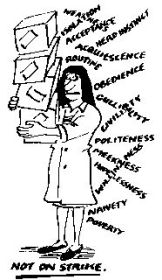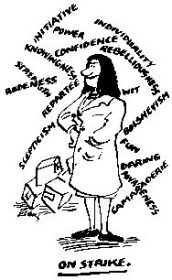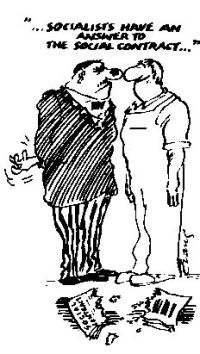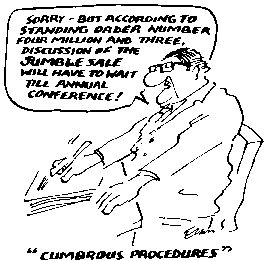MIA > Archive > P. Foot > 3 Letters
WELL, I have really stung you this time. I’m glad of that, in a way, because there’s been a lot of fencing around.

You say that my advice that you should get out of the internal battles of the Labour Party and into the day-to-day industrial struggle is just a cover for saying that you should join the Socialist Workers Party. That is not quite true. Honestly, I wouldn’t expect you to join the SWP straight away. There was a time ten years ago when I thought every socialist who did not join us was either soft in the head or just soft. But times have changed, and even the most diehard party member now realises that people don’t join the SWP easily.
So I meant it when I said that my main appeal to you and your fellow supporters of Tony Benn is that you shouldn’t by hypnotised by the struggle ‘for the soul of the Labour Party’, but should try to put your organisation and influence at the disposal of those who are out there fighting to save their jobs and services.
But now I have drawn out all your vitriol, and I find, as so often before, that you people are far more savage about the SWP (which hasn’t, as far as I know, caused mass unemployment or cut any public services) than we ever are about the Labour Party (whose government has caused both).
You denounce the SWP as both ‘syndicalist’ and ‘vanguardist’ – which really does have us doing the splits!
By ‘syndicalist’ you mean that we are ‘always on about strikes’. In truth, you say, politics is about ‘the whole community’. For every strike that we concentrate on, you say, there are a thousand other vital issues, affecting women or black people, Ireland or housing, the Health Service or public transport, which deserve just as much attention.
There is much truth in your charge: that from time to time there have been signs in the SWP that such matters are regarded as ‘secondary’ and therefore that concessions can be made to them. Equally, there have been times when Socialist Worker has read like a strike sheet, and has ignored political arguments and issues in which even some of the paper’s most solid readers have been involved.
I don’t deny any of this, but the simple fact remains that in a divided society which is based on the exploitation of working people, the main battleground is at the point of production. That is where the wealth is produced. That is where the workers can most effectively hit back. It is where our collective strength and common interest combine most effectively. It is also, incidentally, the area where the Tories and employers behave most true to type, relentlessly and viciously, and where they can expect their behaviour to be studiously ignored by all the press and television.
During the six years I worked full time for Socialist Worker, I covered an enormous number of strikes of every conceivable size in every conceivable industry. I thought my capacity to be shocked would somehow diminish as the years went on. But every time I was absolutely staggered by the contempt with which workers on strike are treated by employers, police, social security officials, and most of all by the media.


All of this was, in every case, countered by the quite extraordinary change which came over the workers involved. They grew ten feet tall, unimaginably more able and more resolute than they were in normal working conditions. Often the worst reactionaries on the shop floor became the mainstream of the pickets. Above all, when usually under our influence, the strikers moved out of their isolated dispute and sought help in the broader movement, they started to learn for the first time what being a trade unionist meant. The slogans ‘an injury to one is an injury to all’ or ‘knowledge is power’ or ‘arise ye workers’, which they had seen before only on trade union banners, suddenly came to life.
Now all these things – the contemptuous behaviour of the authorities and the growth in stature of the people under fire – can happen in all sorts of other confrontations: in the battles of feminists for instance to clear out the male chauvinism of the media, or in rent strikes such as the Glasgow rent strike of 1915 which forced a government first to introduce rent control.
It is also true, of course, that some strikes, though not many, seek to establish reactionary differentials, between workers, or even, in rare cases, to keep a workplace white. But these are the exceptions, not the rule.
The rule is that any socialist worth the name identifies instinctively and crucially with workers in industrial struggle. As far as we are concerned, that is, and will continue to be, the most vital area for socialist organisation and propaganda.
I hear you answering, as you have done so often before:
‘There you are. You are syndicalist. You do think all other political battles are secondary to the industrial battle. How can you expect people who are concerned, for instance, to fight against sexism or British rule in Ireland to concern themselves so exclusively with industrial disputes?’
I reply that these things are not secondary, but the fight for socialist and progressive ideas is most easily fought where poeple are confident in themselves and in their own power to change things. That is perhaps why shop-floor organisation and basic trade union strength is so important. For it is when workers are strong, and especially when they are fighting, that they are most open to socialist ideas and agitation.
I take two examples of something that could be proved over and over again. I visited the occupied Lee Jeans factory at Greenock early last year, as the women’s occupation for jobs was just starting. A lot of the conversation of the young women was about boyfriends, and cooking and women’s magazines. There was a marked deference to the male trade union organiser, and to the few men in the factory. I felt that many of the young women saw themselves to some extent as occupation fodder; that all they could do was to come in on time and carry out menial tasks.
Over the next few months, at meetings up and down the country, I met most of these women again. They had changed almost beyond recognition. It was not just their ability to speak out in public, to argue, to conduct collections, to move people into giving more than they could afford. It was their complete refusal to bow down to the humble roles expected of women in a chauvinist and sexist society. They became, not bores or hysterics, but strong and confident women who were not to be pushed around. That was as much part of their struggle as was their struggle for jobs.
A second example, quite different. In the autumn of 1974 the IRA, in an act of almost unbelievable callousness and stupidity, set off a bomb in a pub in Birmingham. The massacre of working people that followed shocked the entire city.
The following day, as workers came to their factories, there was a powerful, apparently irresistible surge of feeling against any Irish men and women who dared to show their faces. There was an atmosphere of lynch law.
I remember talking at the time to two young shop stewards at British Leyland’s huge plant at Longbridge. They found they were forced to argue politics in order to stem the racist tide. They had not just to condemn the bombings, but to put forward solutions, to argue for the unity of Ireland, for pulling the troops out of Ireland. I am sure that the fact that shopfloor organisation was still strong in most Birmingham factories, and that there were socialists inside, to some extent halted the racist advance, and held the peace between people of different birthplaces and accents.
What I am saying to you is that it is precisely because Ireland does matter, precisely because sexism is a corruption, that we need socialists organised first and foremost where there is the greatest chance that peoples’ attitudes can be changed, and where their collective effort makes our work and our ideas most effective.

I wrote to you the other day about the disintegration of shopfloor organisation in the face of the ‘Social Contract’ under Labour and mass unemployment under the Tories. The cause of this disintegration spells out the remedy. To rebuild shopfloor organisation, to rekindle the tiniest flames of solidarity and common interest, we now need not just dedicated trade unionists, but socialists as well. We are not going to strengthen the picket lines or rebuild the stewards’ committees and combine committees unless we can be sure that socialists inside the workplaces are making these simple tasks their first priority. Why? Because socialists have an answer to any ‘social contract’ between the capitalist system and trade union leaders: we have an answer to unemployment. So we are confident to build the fight against both, and to restore the organisation which both have so comprehensively disabled.
Now what about the rather contradictory complaint that we are ‘vanguardist’?

I don’t think I’ve ever understood what this means. For instance, can you deny that some workers are more politically conscious than others, some more socialist than others? Isn’t the most obvious feature of the working class its unevenness in political ideas: from the Tory Trade Unionists’ Association at one extreme to the left-wing convenor on the other? And isn’t any political organisation ‘vanguardist’ in that it tries to give a lead, to attract others to its point of view or to a course of action? Isn’t it really more elitist or vanguardist, call it what you will, to hope to get the votes of masses of people for a programme which is well to the Left of their own ideas, rather than to work, as we do, where people are fighting and seek to spread and broaden their struggle?
You are nearer the mark in your more general criticisms of us as self-important, aggressive, intolerant. The element of fanaticism, I am quite sure, isolates the small groups on the Left more than anything else.
I have been reading the remarkable essay of the Italian socialist Ignazio Silone in which he gives his reasons for leaving the Communist Party in the late 1920s. At the end of this essay, he writes, rather as you do:
‘I carefully avoided, after I had left the Communist Party, ending up in one of the many groups and splinter-groups of ex-Communists; and I have never regretted this in any way, as I know well the kind of fate which rules over these groups and splinter-groups and makes little sects of them which have all the defects of official Communism, the fanaticism, the centralisation, the abstraction, without the qualities and advantages which the latter derives from its vast working class following.’
Of course the Communist Party in Britain has never had this ‘vast working class following.’ And of course Silone still didn’t find any better answer. He moved rightwards and died a right-wing social democrat. But the charge against the sects is still powerful, and anyone who has spent any time among them knows only too well how exhausting, and sometimes how utterly pathetic is the posturing intolerance of small groups of Marxists who have nothing to fall back on but their own belief that they and no one else are right. The sectarianism of post-war Trotskyist grouplets has much in common with the in-fighting in the dissenting Christian Church in the middle of the last century. There is the same fanaticism, the same polemical hysteria and the same huge distance from the people they try to convert.
Perhaps the’ most distasteful aspect of all this is the enormous commitment demanded of new converts. To join the such-and-such party, it is said, means to give up your whole life to the cause. Anything else is bourgeois self-indulgence!
It would be silly of me to pretend that the SWP (and its forerunner the International Socialists) had not been infected, sometimes badly, with this disease. There are times in the past twenty years when we have run the other organisations pretty close in sheer bloody-minded sectarianism. But we have been saved again and again by our determination to act where people are, not where we would like them to be. This constant insistence on the struggle as it is has acted as a permanent counterweight against the slide into sectarian irrelevance.
Here are two examples. In 1976 and 1977, the National Front were beginning to look like a major political force in this country. They beat the Liberals, for instance, in the 1977 GLC elections.
The Labour government was worried but determined to do nothing. ‘Beat them at the polls’, was the advice of the Home Secretary. Intimidatory fascist marches through black areas were becoming more common, by kind permission of the police and the government.
The SWP called a demonstration in Lewisham in South London to stand in the way of a fascist march. It attracted a large number of people, and was at least partially successful. But stopping marches, which to some extent we could do as a party on our own, was not enough. Somehow, the opinion of the mass of the people who feared and hated fascism, but perhaps did not realise that that was what the National Front stood for, or at any rate kept silent, had to be mobilised.
So we took the initiative in forming the Anti Nazi League. We took the initiative knowing that it would fail unless it attracted thousands of people who did not agree with our party on most other matters.
We wanted and sought a broad-based campaign which included people from the Labour Party, the Communist Party, those who opposed racism of whatever party or of no party. The point of the campaign was not to increase the numbers of the SWP, but to stop the Nazis.
Again: the Right to Work Campaign, the only real attempt at organised protest against unemployment, and the only consistent mobilisation of the unemployed over the past five years. The SWP started this too. But again, from the very beginning, we did not want or try to take a vice-like grip over the campaign. We sought all the time to involve in the leadership of the Right to Work Campaign rank and file trade unionists who were not, and were not likely to be, SWP supporters.
I remember joining one of the marches a couple of years ago in the South Wales valleys. What enthused the marchers was the great well of support which they tapped among the working people of the area. These were Labour voters, of course, to a man and woman: people who had only the remotest concept of the SWP. But their support was sought and welcomed not because we wanted a bigger SWP but because we wanted a more powerful demonstration against unemployment.
The greatest insurance against sectarianism has been the will, which I think inspires every single one of us in the SWP, to assist and encourage workers in struggle.
It is difficult enough even to approach workers on strike. The bigger and more official the strike, the more hostile are the strikers to the intrusion of ‘reds’. I remember proudly sallying forth at the start of the firemen’s strike in the winter of 1976/77 to visit the picketed fire stations of East London as a representative of Socialist Worker. I was thrown off every picket line. The firemen had had instructions not to allow any ‘outside interest’ within shouting distance of a picket. And I remember slinking disconsolately away while the stewards enthusiastically put their case to the representatives of the Walthamstow Guardian and the Romford Recorder.
The point is not (or perhaps not only) that by the end of the strike we were being welcomed with open arms and the Walthamstow Guardian and the Romford Recorder were being ceremoniously burnt in the pickets’ braziers. It is that there is a hostility and resentment among workers on strike to anyone who appears to be ‘cashing in on’ their struggle.
This resentment and hostility is fostered by the media and by union officials, and it is the cause of the isolation and collapse of so many disputes. On their own, shunned or abused by the media and their officials, without any means of putting their case to other workers, the strikers turn in on themselves, bicker and often call off their action without any real change in their conditions.
Breaking down this isolation, organising delegations to other towns and cities, collecting money from trades councils, introducing workers in struggle to other workers’ representatives who have helped before and will help again – these are the tasks to which most members of the SWP have at sometime or other applied themselves.
These things cannot be done in a sectarian or dogmatic way. The workers involved will have no truck with didactic lecturing. They may become interested in arguments about socialism or about how a socialist organisation works, but they don’t want to put their grievances and their fight at the disposal of one party as against another.
We have been dragged away from considering our own navels by real political and industrial pressures and by the demands of real people. That, I believe, is why the SWP grew so much faster than the other sects which were formed in the 1950s or 1960s and which started, if anything, with more members than we did.
And that is why we have survived, and even grown slightly, in the past few, very hard years, during which others have either collapsed into the Labour Party or spun themselves a sectarian cocoon from which they can enthusiastically denounce other socialists who have not found their true faith.
Let me come back to your predicament.
If you and all who think like you, people who want a real transformation of society, who want public ownership and planning and equality and a workers’ democracy, if you all stay bickering in the Labour Party behind the closed doors of committee rooms, then it’s not only you who will suffer; we suffer as well.
If we remain a small group on the fringe of politics, then it becomes increasingly difficult for us to rise above the fanaticism you rightly complain of. If the huge task of organising around local disputes, pushing and circulating a weekly socialist newspaper (something, incidentally, which even at the height of Tony Benn’s successes, you have not been able to do), if this is left to a handful of hyper-dedicated people, then of course, they become more fanatical and more sectarian. It’s only if we can attract support among all sorts of different people from different backgrounds and of different ages; some of whom give a lot, some a little; only then can we build a socialist organisation which can live and breathe as though it was made of human beings, not robots. The bigger we are, in short, the more tolerant and relevant we shall become.

I’ll end with what I am sure is the strongest point: our freedom to act independently as we choose. You are hedged around at every twist and turn by the cumbrous procedures and rules of your party. It is extremely difficult for you to win a monthly meeting or an annual conference, and even then almost all your efforts are directed towards making policy and passing resolutions which you hope will bind a future government. We can move as we think fit, not just from the centre but in the workplaces where we have members and in the communities as well. We can respond to all the initiatives of the Tories and employers with our own initiative, and mobilise our very small resources to a common purpose.
This holds out some hope in these grim and pessimistic times. We are always organising and putting forward our socialist ideas where people are standing up and fighting, where they are winning the power to change things, and where, therefore, they rise above the reactionary tide which otherwise seems, when you read the
newspapers or watch the television, to be swamping us. The seeds of the new socialist society which we both want are sown here. When people, without the breeding and qualifications which our rulers say are so vital, are controlling their own lives, if only for a few days or weeks, then it’s so much easier to see how they can control the whole of society.
I thought of your gloomy letters when I walked round the Mining Supplies factory in Doncaster just the other day chatting to the unemployed young men and women who had travelled from Glasgow and from Cheltenham, from Bristol and from Newcastle, to stand all the freezing night, and many nights, to keep the picket going. They were unheralded in the press, unnoticed by the television. But they represented the fighting spirit which is always there among working people, and which is both patronised and paralysed by the politics that you represent.
I also saw Wajda’s film Man of Iron on the television on the second of January. I hope you and all your friends saw it too. What a brilliant account of the events in Poland over the past two years!
Two messages came loud and clear from every frame in that film. The first was the capacity of workers to change, not according to what they are offered by this party or that at election times, but according to their own industrial strength and their will to use it.
The second, linked to this, is that change needs to be encouraged and harnessed by constant agitation – agitation which at times seems futile and even reckless. Here was the lone, rather fanatical and ridiculous agitator going again and again to prison as he leafleted the public on behalf of free trade unions; and there not much later, was the mass action which eventually won the union its recognition. The one depended on the other: the mass action on the agitator; and the agitation on the mass action.
Change does not just happen, and it certainly doesn’t just come because one day Tony Benn might be prime minister at the head of a left-wing Labour government. It comes when people fight for it. And that is why we, with our four thousand members and a fighting newspaper, are more optimistic and confident than you with your quarter of a million paper members, with your resolutions, intrigues, doubts and dilemmas.
How much more confident and optimistic we would both be if we were members of the same organisation.
And remember, it is no good appealing to me to join the Labour Party. I would not be let in. My application alone would probably cost you a dozen more defections from the Parliamentary Labour Party to the SDP and another couple of points drop in the opinion polls.
No, I’m afraid there is only one possible way in which we can now come together: for you to come to us.
Last updated on 28.11.2004